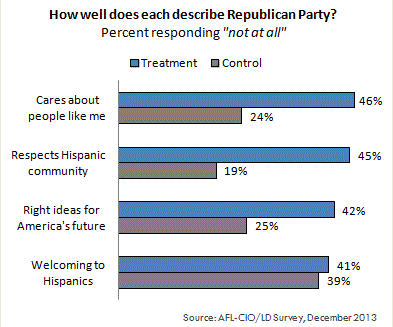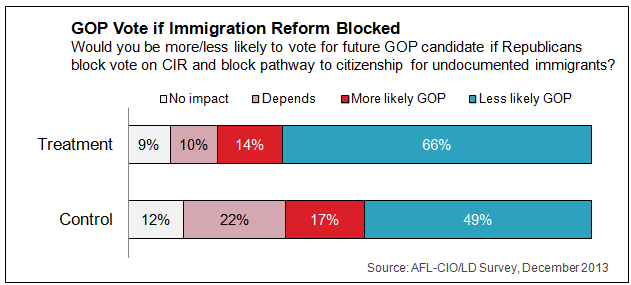As congressional lawmakers return home for the summer recess and campaign for the upcoming mid-term election, Republicans believe immigration is an issue they can use to mobilize their base. Specifically, many are calculating that voters are frustrated with the present crisis at the border and will respond positively to rhetoric that is tough on immigration. Do Republican voters respond positively to anti-immigrant rhetoric and ads? What effects do these same messages have on Latino voters and other segments of the electorate? Political science research shows that anti-immigrant rhetoric and ads do not mobilize Republican voters, but rather lead to higher turnout among Latino voters who are angered by this campaign strategy. The end result is “blowback”, or a situation in which a strategy creates the opposite desired effect. A review of the scholarly literature and survey data from Latino Decisions conclusively demonstrates that anti-immigrant rhetoric and ads hurt the Republican Party.
Campaigns and elections are noisy events in which voters are exposed to hundreds of ads, speeches, and statements from opposing candidates. How does one isolate the effect of a particular ad, speech, or statement on voters? Experimental designs in which subjects are randomly assigned to a control group and various treatment groups allow such evaluations. In the treatment groups, subjects are exposed to differing political ads (with positive and negative messages), while the control group receives none. Analysis of the treatments (in this case, ads) and their associated impacts indicates which had the most significant impact on subjects in terms of both magnitude and direction.
In a recent study by Merolla et al., (2012) an experimental design was used to analyze the effects different immigration media ads have on Latinos and non-Latinos alike. The results indicate that anti-immigrant ads had no effect in stimulating White voters, including White Republicans. However, these same ads caused Latinos to want to participate in politics at higher rates. This makes intuitive sense given that immigration is not an abstract issue for most Latino voters; immigration policy disproportionately affects their immediately family relative to other groups. In a June 2014 survey by Latino Decisions, 62% of Latino voters indicated they know someone who is undocumented. Among those respondents, 91% said that these individuals are friends and/or family. In light of this information, it is unsurprising that Latino voters represent the segment of the electorate that is most likely to be activated by negative political ads and rhetoric directed at immigrants.
Other scholarly studies (e.g. Pantoja, Ramirez and Segura 2001; Bowler, Nicholson and Segura 2006) also find evidence of a Latino blowback on immigration. A recent survey by Latino Decisions and the AFL-CIO similarly finds that Latinos are activated when exposed to anti-immigrant messages. In this study, 600 Latino respondents (the treatment group) were exposed to two political ads with anti-immigrant statements made by Republican representatives. The remaining 400 Latinos (the control group) were not exposed to these ads. The results are striking when we compare the respondents in the treatment group with those in the control group.

Respondents in the treatment group were significantly more likely to evaluate the Republican Party negatively after watching the political ads with anti-immigrant messages. The impact of watching the anti-immigrant ads has political consequences, as two-thirds (66%) of Latinos in the treatment group said they would be less likely to vote for GOP candidates if the Republicans block the passage of Comprehensive Immigration Reform (CIR) and block a pathway to citizenship for undocumented immigrants. Although 49% of Latinos in the control group said they were less likely to vote for the GOP, it is clear that those in the treatment group reacted more strongly against the GOP when exposed to anti-immigrant rhetoric.

Blowback describes a situation in which a strategy creates the opposite desired effect. Presently, many Republican candidates have embarked on a strategy of mobilizing their base by taking a tough stance on immigration. Their campaign rhetoric and upcoming political ads are likely to portray undocumented immigrants as a social threat. This strategy will backfire, as White Republicans are unlikely to respond to these appeals while the Latino electorate will turnout and vote against candidates using this tactic.
References:
Bowler, Shaun, Stephen P. Nicholson and Gary M. Segura. 2006. “Earthquakes and Aftershocks: Race, Direct Democracy, and Partisan Change” American Journal of Political Science. 50: 146-59.
Merolla, Jennifer L., Adrian D. Pantoja, Ivy A. M. Cargile, and Juana Mora. 2012. “From Coverage to Action: The Immigration Debate and Its Effects on Participation” Political Research Quarterly. Published online 9 May 2012.
Pantoja, Adrian D., Ricardo Ramirez and Gary M. Segura. 2001. “Citizens by Choice, Voters by Necessity: Patterns in Political Mobilization by Naturalized Latinos” Political Research Quarterly. 54: 729-50.
Dr. Adrian Pantoja is a Senior Analyst at Latino Decisions. He also is also Professor in Political Studies at Pitzer College, a member of the Claremont Colleges in southern California where he has published numerous academic research articles on how the immigration issue effects Latino voting patterns.


